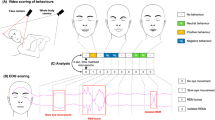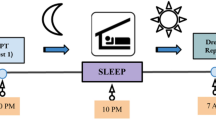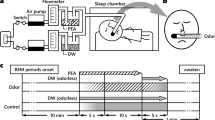Abstract
IT is recognized that there are two kinds of sleep, often called rapid eye movement (REM) sleep and non-rapid eye movement (NREM) sleep, that differ in their physiology and psychology. Awakenings from the first generally yield reports of dreaming. The demonstration of a relationship between the profusion of eye movements and the “activity” or vividness of the accompanying dream1,2 and the finding that barbiturates not only decrease the overall amount of REM sleep but also reduce the profusion of eye movements3,4 per minute of REM sleep led to the prediction that barbiturate administration would result in dream experiences of a more tranquil nature5. A corollary of this would be that withdrawal of barbiturates would result in dream reports indicative of a richer and more vivid dream experience than either barbiturate or pre-barbiturate conditions, for withdrawal of hypnotic drugs accentuates the profusion of eye movements during REM sleep6–8 and is reported to lead to recall in the morning of vivid dreams during the night9,10.
This is a preview of subscription content, access via your institution
Access options
Subscribe to this journal
Receive 51 print issues and online access
$199.00 per year
only $3.90 per issue
Buy this article
- Purchase on Springer Link
- Instant access to full article PDF
Prices may be subject to local taxes which are calculated during checkout
Similar content being viewed by others
References
Dement, W. C., and Wolpert, E., J. Exp. Psychol., 55, 543 (1958).
Berger, R. J., and Oswald, I., Science, 137, 601 (1962).
Oswald, I., Berger, R. J., Jaramillo, R. A., Keddie, K. M. G., Olley, P. C., and Plunkett, G. B., Brit. J. Psychiat., 109, 66 (1963).
Baekeland, F., Psychopharmacol., 11, 388 (1967).
Oswald, I., Sleep (Penguin Books, Harmondsworth, 1966).
Lewis, S. A., in Drugs and Sensory Functions (edit. by Herxheimer, A.) (J. and A. Churchill, London, 1968).
Allen, C., Kales, A., and Berger, R. J., Psychonomic Sci., 12, 329 (1968).
Oswald, I., in Modern Trends in Psychological Medicine (edit. by Price, J. H.) (Butterworth, London, 1969).
Kales, A., and Jacobson, A., Exp. Neurol. Suppl., 4, 81 (1967).
Oswald, I., and Priest, R. G., Brit. Med. J., ii, 1093 (1965).
Foulkes, D., Spear, P., and Symonds, J., J. Abnormal Psychol., 71, 280 (1966).
Siegel, S., Non-parametric Statistics (McGraw-Hill, New York, 1956).
Batten, D., Perceptual and Motor Skills, 24, 1055 (1967).
Goodenough, D., Lewis, H., Shapiro, A., Jaret, L., and Sleser, I., J. Personality Soc. Psychol., 2, 170 (1965).
Author information
Authors and Affiliations
Rights and permissions
About this article
Cite this article
CARROLL, D., LEWIS, S. & OSWALD, I. Effect of Barbiturates on Dream Content. Nature 223, 865–866 (1969). https://doi.org/10.1038/223865a0
Received:
Issue Date:
DOI: https://doi.org/10.1038/223865a0
Comments
By submitting a comment you agree to abide by our Terms and Community Guidelines. If you find something abusive or that does not comply with our terms or guidelines please flag it as inappropriate.



